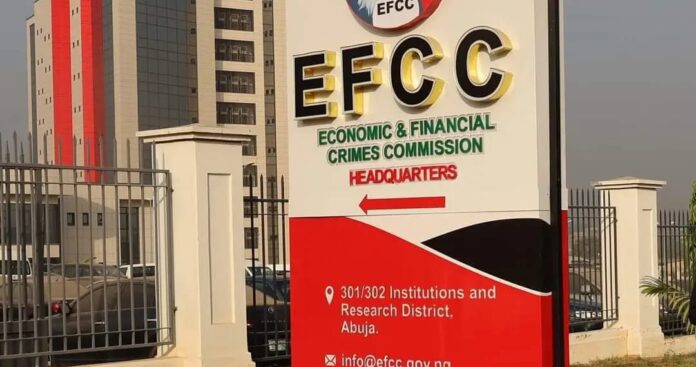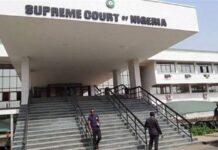The Economic and Financial Crimes Commission (EFCC) is worried following the discharge of former Attorney-General of the Federation, Bello Adoke, SAN, in the fraud case involving the controversial Oil Prospecting License (OPL) 245, widely known as the Malabu Oil deal.
The anti- graft agency said it is presently reviewing the circumstances surrounding the loss of the case to guide its next line of action in the matter
Mr Adoke was the Minister of Justice in the former President Goodluck Jonathan’s administration.
He was charged alongside a businessman, Aliyu Abubakar; Rasky Gbinigie; Malabu Oil and Gas Limited; Nigeria Agip Exploration Limited; Shell Nigeria Extra Deep Limited and Shell Nigeria Exploration Production Company Limited over the Malabu oil scam.
They were arraigned in 2020 on a 40-count amended charge.
But, the judge, Abubakar Kutigi of the Federal Capital Territory (FCT) High Court in Abuja, on 28 March, upheld the no-case submissions made by all the defendants in the case.
The court said the prosecuting agency, the EFCC, filed a poorly drafted charge against the defendants.
It also held that the government failed to substantiate allegations of fraud against Mr Adoke and his co-defendants.
In the ruling, the judge said the EFCC failed to substantiate allegations of bribery and money laundering against the defendants, prompting the striking out of the case.
The judge further noted that the government failed to provide credible evidence linking Mr Adoke and his co-defendants to the alleged crime.
“I have carefully gone through the evidence produced by PW1 Mohammed Sani Abacha, Professor Peter Akpe…
“There is no evidence led by the prosecution to show how the defendants prevented the payment of tax by Malabu to the Nigerian government,” the judge had ruled.
He cautioned the government to desist from instituting such frivolous charges in the future.
The judge said the allegation of illegal tax waivers granted to Shell and Eni remains unproven by the Federal Inland Revenue Service (FIRS) or any authority.
But reacting to the court’s ruling, the EFCC on Friday said it is reviewing the conduct of the prosecuting counsel, Offem Uket in the case
The anti-graft agency had admitted that it had no evidence to sustain the charges against the defendants.
“The review will entail exploration of the option of appeal and possible change of counsel in view of the Commission’s dissatisfaction with the handling of the case by Uket,” a statement from the EFCC spokesperson, Dele Oyewale, said.
Mr Oyewale, however, clarified insinuations of compromise of the case by EFCC, saying the review had no relationship with the “speculations.”
“EFCC is not obliged to embrace such narratives as it neither accused any of the parties of any unsavoury conduct nor made any conclusive statements about any investigation on the matter,” he stated.
He advised the public to “ignore effusions of mischief makers on the matter and await the next course of actions.”










